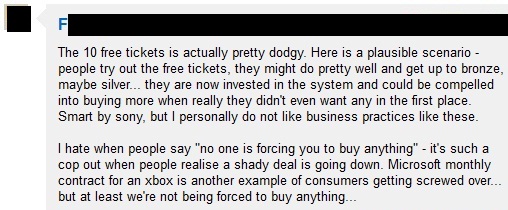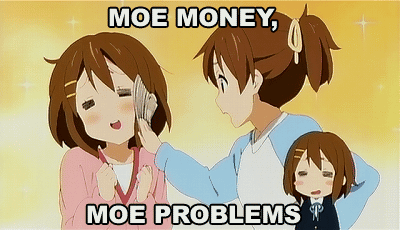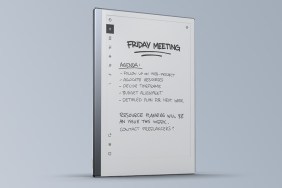I don't always dust off the psychology books, but when I do, get ready to be learned.
Recently, PS3 action-adventure Uncharted 3 was the subject of an update that introduced ticket-based tournament play. Once per tournament duration, everyone who plays the game will get 10 free tickets and can buy more if they so desire. Hey, fine by me. If you don't want to participate, don't buy more tickets. Not interested in the tournaments? Don't even use the free ones then. These are special events and they come with a price, just like when a bunch of my relatives put in $10 each to participate in an NHL playoff pickem pool or March Madness bracket. You don't wanna pay, you don't have to play, and if we don't collect no tolls, we don't eat no rolls.

There are some, however, who are upset by this. Spending more time in this world and ever becoming more capable of seeing the intent behind actions, offers, and "deals," there's a camp that views this as another crime against gaming deserving of categorization with on-disc "DLC" and online passes. In my regrettable reading of the intertrons, I came across the following comment on the matter. I've stripped out the author's screen name and will just call him "Mr. F" (~Mista Ef~) :

Yeah, you think? That's a big part of how business works. A lot of people are afraid to try new things, especially when there's a price tag involved. Hand out some free samples and/or a few coupons, and your possible market gets a little less shy. There's no shame in it; this practice is everywhere and quite frankly, it's good for everyone. The company at the head of it gets a new customer, and said customer discovers a product he enjoys. Or maybe this potential customer doesn't enjoy it after all, and he turns away now knowing for certain that he's not interested rather than carrying on not quite sure.
This is a man speaking as if he has no self control at all. He speaks as if being given a free sample robs someone of their own right to choose, like it drains a man of free will. This is where the human race might take offense. If a small sample of something being given for free is a "dodgy", then virtually every business of all time is run by unholy slimeballs, from the monopoly runners to the mom-and-pop corner stores, and everything in between. Next time I see pop, he's gonna get popped, and oh, heaven help mom!
Mr. F. might additionally share the following wise insights on comparable business moves.
On soda coupons:
The buy-1-get-1 free deal on 2-liter Cokes is actually pretty dodgy. Here is a plausible scenario: people who usually prefer Pepsi try out the coupons, they might do pretty well at stocking up for parties with more cola for less money… they now have tasted a lot of the other system and could be compelled into buying more when really they didn't even want any in the first place. Smart by Coke, but I personally do not like business practices like these.
On subscription-based games offering the first month free:
The free month is actually pretty dodgy. Here is a plausible scenario: people try out the free month, they might do pretty well and get up to level 10, maybe even 15… they are now invested in the system and could be compelled into paying monthly when really they didn't even want to play very long in the first place. Smart by the devs, but I personally do not like business practices like these.
On kids staying free at the Holiday Inn:
The kids staying free is actually pretty dodgy. Here is a plausible scenario: people try out hotel because the kids stay for free, they might do pretty well swimming in the pool, maybe filling a bunch of buckets with ice from the machine… they are now invested in the system and could be compelled into ordering pay-per-view movies because parents need a way to quiet the kids down when they didn't even want to bring them along in the first place. Smart by Holiday Inn, but I personally do not like business practices like these.
On skin sites offering a free tour:
The free tour is actually pretty dodgy. Here is a plausible scenario: people look at the free images, they might do pretty well and see a couple of asses, maybe even a boob… they are now rock hard or "in the system" as I call it, and could be compelled into paying for something when really they only started out by Google Image Searching the newest Sports Illustrated Swimsuit Issue. Smart by the nudey sites, but I personally do not like business practices like these.
On movie previews:
The preview is actually pretty dodgy. Here is a plausible scenario: people see some clips that raise questions or include funny jokes, they might do pretty well and laugh at something or wonder how it all will end… they are now invested in the system and could be compelled into paying for a movie ticket when really they just wanted to stay home in the first place. Smart by the filmmakers, but I personally do not like business practices like these.
On demos:
The demo is actually pretty dodgy. Here is a plausible scenario: people play a demo, they might do pretty well and earn a few trophies and create save data which they can carry over into the full game… they are now invested in the system and could be compelled into paying for a game when really they just wanted to mess around in a demo. Smart by the publishers, but I personally do not like business practices like these.
On trying to get out of paying child support:
Second base is actually pretty dodgy. Here is a plausible scenario: they try out a girlfriend, they might do pretty well and get up to second base, maybe third before wanting quit… they are now invested in the system and could be compelled into going further when really they didn't even want to get any in the first place. But if she puts the offer on the table and he's already gone that far, how is a man to turn back? Smart by the girl, but I personally do not like business practices like these.
I mock, yet I must also admit that Mr. F's warnings are not completely without merit. People are kind of stupid, and he is right in pointing out just how many of us are weaker than we'll ever admit. In psychologist Brian Wansink, Ph.D.'s famous 2005 study (found within Obesity Research, Vol. 13, No. 1), people sat down to a soup lunch, some of them with bowls secretly connected to a soup vat under the table. While they ate, half of their bowls would be refilled. You can see where this is going. At the end, the people with the stealth refills did indeed consume a hell of a lot more soup while not describing themselves as being any more "full" than those who only had one bowl. The subconscious runs the show more often than the conscious, or even the body it lives in.
So it goes with credit cards. When I first moved to Japan, I was astounded to find some furniture stores, restaurants, and even travel agencies that don't accept credit cards. This is a cash-based society, my friend. Some years ago, my wife and I ordered international plane tickets only to find that the travel agency selling them to us only took cash; we had to walk in with $8,000 in-hand if we were to pay. This organization is not alone, either. I thought about this and wondered how, how in the world the Japanese people could have an average personal savings so much higher than Americans, so many of whom seem to pride themselves on being economical experts. It turns out that The American Dream is often purchased with debt, and the guy signing the credit card receipt is Stevie Subconscious.
Repeated studies show that people spend way more money when using a credit card than with cash. The research of Psychology Today contributor Art Markman, Ph.D., has shown that people spend small bills far more eagerly than big ones, even if the amount being spent is the same. Most people will blow $50 quickly if it's all tens and fives, but hesitation comes into play when they need to part with the big five-zero. Why? The subconscious is in a direct fight with the conscious. Small bills don't register as being very important to the subconscious, so it's easy to let a whole mess of them go, unlike a big bill. With a credit card, meanwhile, our conscious brain realizes that we will eventually have to lose real bucks over the decision we've just made, but subconscious only sees the card being handed back, along with a shiny new video game or phone or throwing knife.

Like it or not, damn, Mr. F actually has a point, based on what science has shown us. The logic he displays above would obviously begrudge credit cards for offering a person all kinds of spending power. They don't force us to buy anything with them, yet so many people find themselves unable to resist, eventually buried under a mountain of debt. They have so many conveniences, and it should be noted that not all people who use them are a slave to them. Not at all. Are they a shady business? Perhaps at times. Should we get rid of them entirely? Regulate them more? But would that solve the problem? Not everyone makes life-destroying decisions with them, but some people do, so… so… damn, this ain't easy. And it actually sounds eerily similar to the ongoing gun ownership debates in the US. Scary.
Here is the crossroads at which we stand. Companies of all types provide us with options as to how we spend our limited amount of money. They are just that, options. Is the human subconscious a sucker? You bet, but it's a sucker with an absurd amount of power. Businesses know this, and will therefore always be in competition with each other over who can best convince you that their product is worth your money, and once you buy it, that their other products are also worth your money. In the end, what it takes is some financial responsibility and being honest with yourself. That'll sound too simple, I'm sure, but it's true.
Mr. F. might hate the defense that "no one is forcing you", but he and the angry mob that think this way need to, quite frankly, grow up a little bit. Subject to manipulation as people may be, learning to make responsible decisions with your money is a part of life. You have to realize that you can't purchase every single thing that tempts you.
And when you do purchase something after sampling it for free, then it obviously has some sort of appeal to you. If one's being "invested in the system" is appealing enough to pay money for continuing in the tourney, then great, let him pay the fee and keep playing. If it's not really worth the money, then be an adult, exercise some restraint, and don't become someone who buys every single thing regardless of his ability to afford it. Services like Xbox Live are the same way, and to deny it is simply to express a sense of entitlement far too present in the gamers of today. If you don't like something, seek an alternative. Give it up, walk away, and move on. Why be mad about it?
Stay conscious, my friends.
(Read a piece on credit card spending by the above-cited Dr. Markman here. It's a follow-up to the piece I quoted.)










